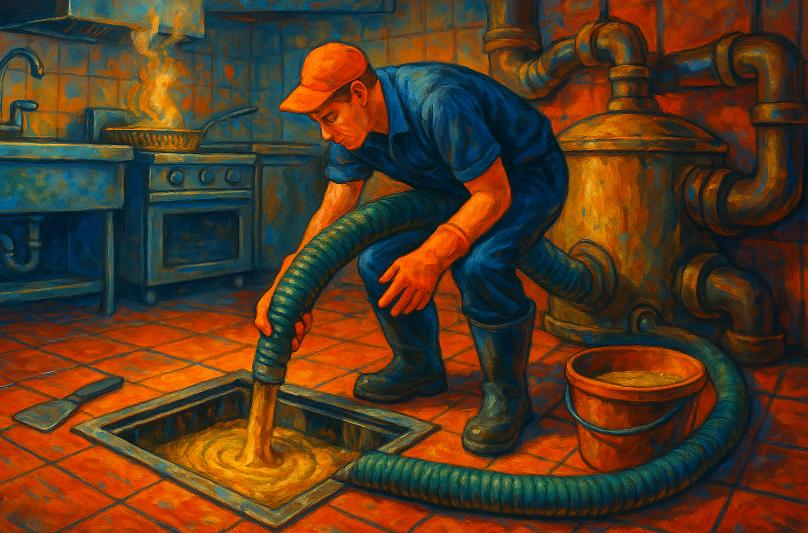What most kitchen operators discover too late is that grease trap maintenance doesn’t have to be a grand production. A few minutes of vigilance, performed daily, is enough to keep things calm and invisible—like a stagehand in black, making sure the show goes on without incident. Ignore it, and you’re suddenly starring in a very public performance you never auditioned for: the blocked-drain catastrophe.
Why Small Habits Trump Big Emergencies
Think of your grease trap as the moody character actor in your kitchen drama. Treat it right and it’ll carry the show without complaint. Neglect it, and it demands center stage at the worst possible moment. A daily scrape of plates before rinsing, a quick wipe of pans with paper towels before washing, or a habit of keeping certain oils out of the sink entirely—these are not glamorous acts. But they are precisely what keeps the trap from becoming a fatberg incubator.These micro-rituals extend the lifespan of the trap itself, reduce the frequency of professional interventions, and stave off those inconvenient shutdowns where the mop bucket becomes the only functioning basin in the building. They also save you from dealing with inspectors whose poker faces barely conceal their delight at catching you out.
The Financial and Legal Fallout of Neglect
Some things are negotiable in business: décor choices, portion sizes, even whether to serve fries in those silly metal baskets. Plumbing infractions, however, are non-negotiable. City codes around grease management are often strict, and violations come with fines hefty enough to make your accountant choke on his sandwich. Beyond fines, blocked lines can also mean forced closures—an expensive pause button on your revenue stream.Grease doesn’t just threaten your pipes; it jeopardizes your reputation. Word spreads quickly when a kitchen has to cancel bookings because of “plumbing issues.” Customers imagine a swampy underworld beneath the fryer, and once that image lodges in their heads, no amount of lavender-scented hand soap will dislodge it.
Spotting Trouble Before It Speaks
A healthy pipe is a silent pipe. Once it starts speaking—through sluggish drains, strange odors, or a low gurgle like a bored teenager—it’s already telling you something is wrong. The trick is learning to read the quieter signs before those sounds arrive.- Odors that refuse to vanish no matter how much lemon-scented detergent you deploy.
- Water pooling around floor drains after only light use of the sink.
- A subtle film of grease appearing on surfaces near drains, as though the kitchen itself is sweating fat.
- Slow drainage during peak hours that magically improves after business slows.
Daily Attention Without Obsession
There’s no need to turn grease management into a new religion. Nobody’s asking you to light candles around the trap or whisper affirmations to the drain. But a few daily gestures—scraping solids into the bin, rinsing with hot water at the right times, and keeping a record of when the trap was last cleaned—keep things steady. Kitchens that make these tasks second nature hardly notice them, yet reap the reward of uninterrupted service and drains that don’t sound like they’re auditioning for a horror film soundtrack.Professional servicing still has its place, but it becomes a scheduled routine instead of an emergency distress call. By the time most establishments pick up the phone in a panic, they’ve ignored weeks of warning signs. Preventive habits transform that late-night plumbing disaster into a calm, predictable appointment marked on the calendar.
When Staff Become Secret Heroes
Front-of-house staff get the applause, chefs get the write-ups, and managers get the ulcers. But in many kitchens, the unsung heroes are the ones who notice something’s not quite right with the drains. A prep cook who mentions the sink backing up, or a dishwasher who flags a new smell—these are the people quietly saving the day.Training staff to recognize early signs doesn’t have to be tedious. A five-minute briefing is enough to convey what to watch for. Empower them to speak up, and you’ll find your grease management program is more robust than any poster on the staff room wall could ever be. Think of it as crowd-sourced vigilance—cheap, effective, and oddly satisfying.
The Unseen Payoff
Here’s what’s rarely mentioned: proactive care makes your kitchen calmer. Staff aren’t scrambling with buckets during the dinner rush. Managers aren’t bargaining with inspectors. Customers never know the near misses that have been averted. The absence of chaos is difficult to measure, but you’ll feel it in the steady hum of a kitchen that simply works.There’s also a long-term environmental benefit. Properly managed grease traps mean fewer pollutants enter municipal sewers, sparing treatment plants from unnecessary strain. So the next time you’re congratulating yourself on recycling initiatives or composting scraps, remember that your humble grease trap plays its part in keeping the wider system flowing.
Pipe Dreams and Nightmares
Neglecting grease traps is like ignoring a toothache. The problem grows in the shadows, feeding quietly until one day it demands all your attention. By then the fix is painful, expensive, and involves strangers poking around where you’d rather they didn’t. On the other hand, tending to your drains with modest care keeps those nightmares in check.Floods, fines, and phantom clogs are not inevitable features of running a kitchen. They’re symptoms of apathy, easily replaced by calm pipes and a reputation for running a tight ship. A little foresight saves a lot of mopping.
So let silence reign in the pipes. Let water run without drama, dishes flow without interruption, and staff breathe easier knowing the drains aren’t plotting a mutiny. That quiet is the sound of a kitchen in control, and it’s worth every scraped plate and wiped pan.
Article kindly provided by greasepd.com

